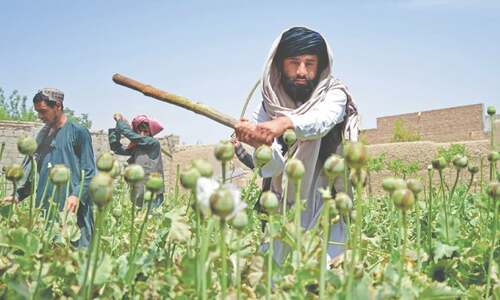The Afghan Taliban said on Tuesday they have quelled protests in a northern province over security forces’ attempts to eradicate opium poppy cultivation which generates income for many impoverished farmers.
Taliban authorities were holding meetings in Badakhshan, spokesman Zabihullah Mujahid said in a Whatsapp message, after several days of protests, in which two people were killed.
Mujahid said in a separate statement that a delegation from Kabul, led by the defence chief of staff, would this week travel to Badakhshan to investigate, a rare official acknowledgement of civil disturbance since the Taliban returned to power in 2021.
Since then, they have vowed to restore control over the entire war-torn nation and have at times forcefully broken up protests in urban areas, especially against decisions that restrict women from education and many workplaces.
“The Badakhshan issue can be solved,” Mujahid said.
“Two of our countrymen lost their lives during the clashes, their rights will be observed,” he said, adding that authorities would meet with relatives and make a decision over compensation for their deaths.
International research firm Alcis released research based on satellite data last year showing there had been a drastic reduction of opium production in most provinces between 2022 and 2023, often by more than 90 per cent.
However it noted that in Badakhshan, the amount of land used for poppy cultivation had grown.
Mujahid did not elaborate on the cause of the deaths. Local broadcaster Tolo reported that the two had been killed as the protests became violent and security forces opened fire late last week.
Zabihullah Amiri, head of the Taliban-run provincial government’s media department, said that an official delegation from the provincial capital had travelled to the two districts to hold meetings and that the areas were now “under control”.
“They accepted the legitimate demands of the people, at the moment, there are no issues in Argo and Darayim districts, he said.
“The people and area are under the control of security forces, and the latest update is that people have committed to cooperating with security forces to eradicate poppy cultivation.”
The Taliban seized power in 2021 as the United States and its allies withdrew troops after a 20-year war launched in the weeks after the September 11, 2001, attacks on the United States.
In 2022, the Taliban’s supreme spiritual leader ordered a ban on narcotics cultivation in the world’s then-top opium producer.
Many Afghan landowners and labourers rely on growing opium poppies, especially in the Taliban’s historic heartland in the south.
Badakhshan shares a border with Tajikistan and China, with which the Taliban are trying to improve economic links.
The province’s population is predominantly ethnically Tajik, in contrast to the Taliban, most of whose top leaders are ethnically Pashtun, which can exacerbate ethnic tensions despite Taliban promises they will govern the country in the interest of all Afghans.














































Dear visitor, the comments section is undergoing an overhaul and will return soon.